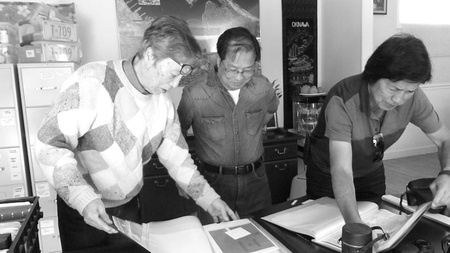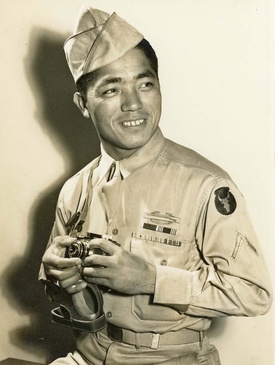Their activities transcend race, country and religion.
Immediately after the war, the late Taro Higa, a second-generation Okinawan born in Hawaii, called on Uchinanchu from around the world to send supplies to Okinawa, which had been reduced to ashes by the ground war. The activities led by the late Taro Higa were turned into a book by documentary filmmaker Tetsuro Shimojima titled "Pigs from the Sea Came!" In July 2018, at the suggestion of Tamiko Uehara, an Okinawa private ambassador living in Los Angeles, Shimojima will hold a lecture in Gardena, a suburb of Los Angeles, to convey Taro's achievements to the younger generation.
Prior to the lecture, in February 2018, Shimojima visited Taro's eldest son, Alvin, at his home in Santa Maria, California. "I've been thinking about Taro for the past 20 years, but I needed to know more about him in order to speak with confidence about what he was really thinking," said Shimojima. With Alvin's help, Shimojima put a USB containing the mountain of documents Taro left behind. After that, I had the opportunity to meet Shimojima, who stopped off in Los Angeles with Alvin after Santa Maria.

"Taro is a second-generation Okinawan born in Hawaii. After serving on the European front, he visited Okinawa in 1945, when pigs, a source of food, had disappeared from Okinawa, a land of pigs. To support the lives of the Okinawan people, Taro first sent food, clothing, and shoes, and eventually began sending crop seeds that would lead to production and fishing hooks. His activities began in Hawaii, and spread to Okinawan communities in New York and Los Angeles, and even to Central and South America. Christian churches also became involved, and it became a major activity that transcended the boundaries of race, country, and religion."
Over 70 years ago in Hawaii, Okinawans were discriminated against by Japanese people from the mainland. One of the reasons for this was that while handling pigs was frowned upon on the mainland, Okinawans used pigs as their main food, raising them themselves, cooking them, and serving them on restaurant menus. Pork dishes were popular among Americans, and Okinawans were successful in the restaurant business. Taro was at the forefront of the Uchinanchu living in Hawaii who rose up to save Okinawa from its wounds. Taro was raised by his grandparents in Okinawa from an early age. There is no doubt that he felt strongly that Okinawa was not only his parents' hometown, but also his own.
Shimojima believes that by telling the true story of Taro, who demonstrated leadership driven by his love for his hometown, to young people today, it may serve as an opportunity to reconsider our world, which is full of division and conflict.
"Not only are there conflicts all over the world, but Japan is also in a terrible situation right now. I think Taro's relief movement in Okinawa could be a message that shines light. Now is the time to appeal to people that we have overcome barriers and come together for Okinawa."
Shimojima continued, "Japanese people require children to attend peace classes in Hiroshima as a duty. However, these peace classes have now become a mere formality, and they lack the motivation to ask what they can do for peace and to take action."
It's important to not just think about it, but to act
According to Alvin, Taro was a person with different ideas than others. He also always said that it was important to act, not just think. This was a departure from the groupism of Japanese people, who tend to look out for others. Alvin said he had a lot of respect for his father.
Taro, who started an electrical appliance store business in Hawaii using the electrical engineering he learned in Japan, was also a brilliant inventor. "My father invented turn signals at a time when cars didn't have them yet. But he never got a patent for it."
Alvin runs multiple businesses based in Santa Maria. Even when he is away from his business base, he always remotely monitors the site by viewing real-time video footage on his smartphone to check for any abnormalities. It occurred to me that this smart way of doing things may have been inherited from his father, Taro.
When asked why Shimojima, who is originally from Nagano Prefecture, is so attracted to the people of Okinawa, he replied: "In 1975, when I was a graphic designer and my children were just two and three years old, I lived on Ishigaki Island for a year with my family of four. The villagers were kind to us Yamatonchus, and when we returned home, vegetables would be left for us while we were away. When we returned to Tokyo, they held a farewell party for us, and each person said their goodbyes."
And in Shimojima's eyes, who has visited California several times for research, he feels that "the Okinawan spirit is stronger among the Uchinanchu here than it is in Okinawa."
The title of the July lecture is "Treasure of Okinawans Spreading the Word of Taro Higa's Humanisum to the World." Shimojima is currently seeking information about the postwar Okinawa relief movement that Taro was involved in. He is calling on people who were involved in the movement or knew Taro to contact him.
Contact: tshimo@ae.auone-net.jp
* * * * *
Treasure of Okinawans Spreading the Word of Taro Higa's Humanism to the World
July 1, 2018 2:00pm - 5:00pm
Ken Nakaoka Community Center
1670 W. 162nd St., Gardena, CA 90247
Donation:$10
© 2018 Keiko Fukuda






